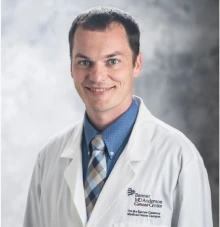
Clinical Specialty Advisor
Gary Walker, MD, MPH, MS
Division Chief for Radiation Oncology at Banner
Note: You must be a current student with an active account to access Dr. Walker's profile.
What are some important statistics around the specialty?
Radiation oncology has historically been a competitive field, though recent years have seen fewer applicants. Given the aging population and greater than ever need for oncology services, the job outlook is good.
What general advice do you have for someone choosing this specialty?
Spend some time with a radiation oncologist to learn about the field. Radiation Oncology is a great mix of technology and patient care.
What are the top three areas that students can focus on to help prepare themselves for a successful residency application and a successful transition to residency? (i.e.grades/academics, professionalism, any of the categories listed above, etc.)?
Learn about the specialty to make sure it is a good fit. Radiation Oncology is a very evidence-based field, and most applicants complete some research.
What resources would you share with a student who is just starting to research their interest in this specialty and/or wants to learn more specifi cs of this specialty (anything from what an atypical day may look like to specifi cs on rotations, specialty-specific residency info, fellowships)?
Come spend a day with us! Our days are filled with very interesting cases, direct patient care, and using technology to help our patients.
What subspecialties exist with this specialty?
Most radiation oncologists DO NOT complete a fellowship, although there are some in proton therapy or pediatrics. You can specialize in a disease site with just a residency training.
What does a typical workday or work week look like (hours/schedule/shifts, work setting, team-based environment, acuity, etc.)?
About half our time is spent in direct patient care. The rest is spent creating and evaluating radiation treatment plans, researching, and administrative work.
What are the important traits, qualities, and/or considerations recommended for physicians in this specialty?
Some people think this is a depressing field, but it is not! Most patients do well and live through their cancer journey. Our job is to help them feel better, which can even just be accomplished with some kind words and reassurance/education about their cancer.
How does the specialty work differ in various settings (e.g., a private vs a community vs an academic environment)?
There are lots of different practice types. You can even specialize in brachytherapy which is a type of procedure to deliver brachytherapy right to the tumor using needles, etc.
What does training for this specialty look like (how many years, is a separate prelim year needed, etc.)?
An intern year plus 4 years of residency.
What types of experiences might strengthen my future residency application, especially in areas of service, leadership, and research?
Any research projects are helpful. Any experiences exposing you to cancer patients will be helpful.
Is there a specialty interest group? If not, what other networking options would you recommend? Are there any specific national organizations or committees I should join?
ASTRO has several resources for medical students.
What advice would you offer MS1s and MS2s who are interested in this specialty?
Come spend a half or full day shadowing to see what it is like!
How and where can I find other mentors for this specialty?
Banner MD Anderson has radiation oncologists throughout the valley, and we can pair you up with a great mentor.
Is there anything else in addition to the suggestions above that could aid my future application, now that Step 1 is P/F?
The letters of recommendation and research experiences are critical.
Which group and association memberships might strengthen my future residency application(e.g., AOA, GHHS, MSG, Specialty-specific groups, etc.)?
N/A
How important are Step 2 scores to this specialty?
Vital.
Are publications important to this specialty? Is there a general number of publications or presentations I should be aiming for? How important is it for these to be within the specialty I am pursuing?
Any research experience will be helpful.
What is a general recommendation for how many programs to apply to (recognizing that this may vary based on student situation)?
Most apply to a couple dozen programs.
What letters of recommendation are recommended for this specialty (e.g., from research,
physicians within this specialty, academic, etc.)
Letters from well-known radiation oncologists are most helpful. Ask for letters from those who are also familiar with you. You should have a minimum of three, but four is preferred.
If other disciplines are appropriate for letter of recommendation writers, are there specific specialties you would strongly recommend?
Medical Oncology.
How competitive are the residency programs in this specialty?
In the past, it was a highly competitive specialty, but that has changed in recent years.
What is UA COM-P's history with matching in this specialty?
We have had some competitive students match at top programs.
Are away rotations required for this specialty, and if so, when should I plan to do them?
You should plan to complete away rotations during the summer of your final year of medical school.
Program Information Specific to Radiation Oncology
Update for Academic Year 25-26
Elective Recommendations from Clinical Specialty Advising
- Note: You must be a current student with an active account to access
Additional Resources
Click here to visit the American Society for Radiation Oncology (ASTRO) website

